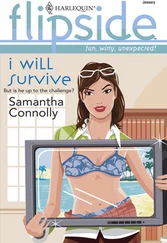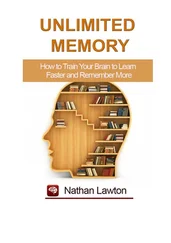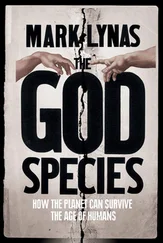The thread that runs through Lilith’s Brood is the idea that human survival involves radical transformation. At the same time, Butler offers us reassurance that though our bodies may change and our cultures fall under alien influence, we will retain our humanity. As Lilith’s children come of age, we begin to see the world from their perspectives as creatures who are part of a species that never existed before. Though they are half Oankali, they treasure their human sides, too. Indeed, the first human-Oankali hybrid ooloi winds up falling in love with a man and a woman from a separatist human community, and discovers in the process what makes humanity so valuable. Unlike other species the Oankali have assimilated, only the humans have put up organized resistance to assimilation. As a result, the Oankali realize that they have to change their way of life. They will no longer assimilate whole species, but instead leave part of each species behind to continue on its own path. You might say that humans inject pluralism into the Oankali culture. And the Oankali, for their part, give humans a peaceful future among the stars.
So how can such an outlandish story shed light on our future as a species?
The strength of Lilith’s Brood as a thought experiment lies in Butler’s suggestion that human survival means an endless and increasingly profound series of compromises. Importantly, the books do not have a tidy, happy ending—far from it. Though the humans survive, both as pure humans and as hybrid Oankali, they endure incredible losses that some might argue are worse than death. To put this in the kind of historical perspective that we began with, the long-term outcome of cultural meetings between Africans and Europeans could hardly be described as unambiguously good, even though slavery was eventually abolished. We cannot ever hope to reach a future where the scars of history completely vanish, nor can we expect that we won’t be wounded again in the future. The key is to understand those injuries in the context of a much longer story about the great transformation known as survival. Hopefully, the rewards of seeing our half-alien children building an improved world can offset the injuries that produced them. This is why we survive, Butler suggests. We want to witness the birth of something better.
In Lilith’s Brood, Butler resists offering a pat definition of what “something better” might be. Certainly it seems that the human-Oankali way of life will be healthier, more sustainable, and more peaceful than ours is today. The author also hints that it will involve preserving what’s best about humanity: our ability to change while remaining true to what came before us. Perhaps most important, “becoming better” doesn’t mean transcendence. Though her future humans are vastly more powerful than us, they don’t achieve a state of perfection. They are the hybrid result of compromise—better than we are, but still dealing with conflict and disappointment.
One of the great lessons about future survival that we can take away from Lilith’s Brood is that it will require us to change. And those changes may be a lot more difficult, and a lot weirder, than we expect.
It’s easy to say that we need to change to survive, but how do you get people to risk everything to do it? How do we unite people divided by those symbolic cages and work on a long-term goal together? That’s a question Butler tackles head-on in two of her most realistic novels, Parable of the Sower and its sequel, Parable of the Talents, both set in a near-future United States that has been torn apart by poverty, climate change, and political instability.
We begin with Los Angeles burning down. In Parable of the Sower, we find ourselves in one of the last remaining gated communities outside L.A., where gangs have breached the walls and are setting houses on fire. A teenager named Lauren Olamina heeds what her father taught her on the shooting range, grabs her gun and emergency backpack, and flees into the burning night to find a safe road up to Northern California. She’s heard things are better up there. Along the way, though, she and her traveling companions are kidnapped by a militia and tortured in reeducation camps. After months of beatings, they’re released when the U.S. government begins to take power back from the separatists and gang leaders who have claimed the land.
During her ordeal, Lauren solidifies a plan she’s had since childhood. She will create a new religion. It will be a system of beliefs that she hopes can bring people together in empathy, preventing anyone else from ever having to endure what she did. She uses the word “God” in her teachings, but not the way most Americans would. First of all, God isn’t a white guy with flowing hair, floating in the clouds. God is an abstraction, described only as “change.” Lauren invokes this God to aid people who are suffering, but she also claims her God is devoted to shepherding the children of Earth into space, where they will scatter joyfully to the stars. Looked at from one perspective, Butler is drawing from the Judeo-Christian God, whose idea of justice in the Bible helped African-Americans protest slavery and inequality in the United States. But looked at from another perspective, this abstract God of change reflects the idea of evolution in action. Either way, Lauren’s God is a powerful idea, one that her characters in postapocalyptic America use to survive an ordeal that nearly destroys humanity.
In Locus magazine, Butler explained:
I used to despise religion. I have not become religious, but I think I’ve become more understanding of religion…. Religion kept some of my relatives alive, because it was all they had. If they hadn’t had some hope of heaven, some companionship in Jesus, they probably would have committed suicide, their lives were so hellish. But they could go to church and have that exuberance together, and that was good, the community of it. When they were in pain, when they had to go to work even though they were in terrible pain, they had God to fall back on, and I think that’s what religion does for the majority of the people.
The Parable novels are, in essence, a story about reconciling religion with social change, God with science, and the past with the future. In these books, Butler makes explicit what is only hinted at in Lilith’s Brood: Humanity’s story must be one of constant change because that is one way to transmute pain into hope. Lauren’s goal for humanity, and, indeed, the goal of the book that you are reading, is to get us off this crowded planet and into space. There, we can continue to change and hopefully, through exploration, learn more about how to build a civilization that doesn’t lock its members into various cages that prevent us from seeing our common goals.
But, as Butler told a student attending one of her lectures, “There’s no single answer that will solve all our future problems. There’s no magic bullet. Instead there are thousands of answers—at least. You can be one of them if you choose to be.” First, however, you must be brave enough to turn away from death, embrace change, and survive.
In the next two parts of this book, we’ll explore two ways humanity will need to transform in order to survive as a species, with our histories and traditions intact, but changed enough to make our future civilizations sustainable ones. We’ll begin by transforming the cities where so many of us live and work. And, ultimately, we’ll start building those cities beyond this dangerous, explosive planet we call Earth. We’ll scatter to the stars, changing ourselves in order to survive, but always remembering home.
Читать дальше
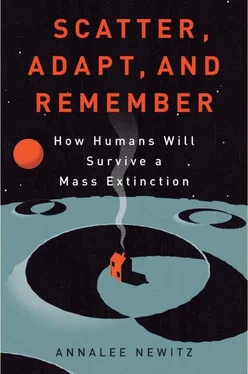

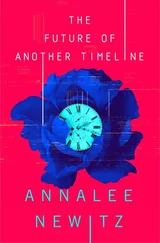



![Аннали Ньюиц - Автономность [litres]](/books/424681/annali-nyuic-avtonomnost-litres-thumb.webp)
